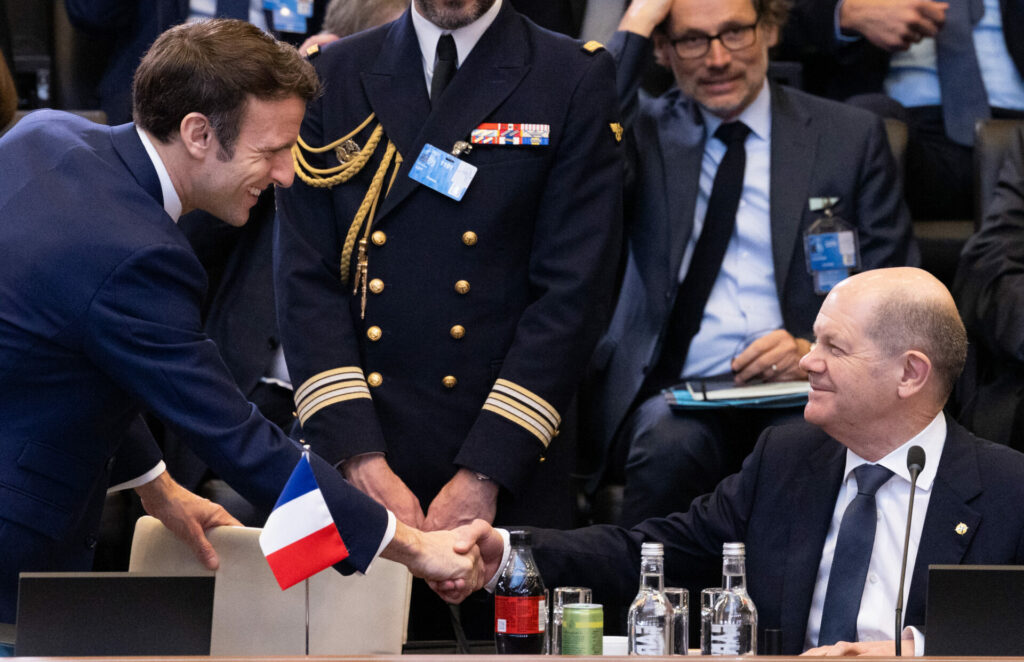France and Germany will support Ukraine "as long as necessary" in the war against Russia, said German Chancellor Olaf Scholz and French President Emmanuel Macron on Sunday on the sidelines of a meeting in Paris.
The pledge comes after the summit with Ukraine's 50 allies agreed on more arms supplies, and both Germany and France expressed their "undiminished support" for Ukraine.
"We will continue our support for Ukraine, as long and fully as necessary, in defence of our European peace project," Scholz said. "After 24 February (the day Russia invaded Ukraine), our union has not divided or shirked its responsibilities," Macron added.
The German-French summit was organised in Paris to commemorate the signing of the Elysée Treaty, exactly 60 years ago on Sunday – 22 January 1963, when the two countries sealed their post-war reconciliation. Now, the treaty is still considered the basis for friendship between the two countries.
'What more does Germany need?'
The ceremony in Paris was meant to show renewed unity, especially in light of the relationship between Germany and France seemingly having weakened in recent months, mainly due to the consequences of the war in Ukraine: on several key issues, such as a price cap on gas and arms supplies to Ukraine, the two European powers were not on the same page.
While the German-French pledge comes after the summit with Ukraine's 50 allies, which agreed on supplying heavy weapons, but not yet on sending the German Leopard 2 tanks that Ukraine has long been asking for. Pressure on Germany to make the tanks available continues to mount. On Saturday, the Baltic states of Estonia, Latvia and Lithuania already jointly called on Germany to agree to provide the tanks.
The Polish Prime Minister Mateusz Morawiecki also expressed his displeasure at Germany's reluctance, saying that if Germany does not give the go-ahead, he is ready to set up his own coalition of countries that will send the tanks. "What more does Germany need to open its eyes and act in line with the potential of the German state?"
The British Foreign Secretary, James Cleverly, also renewed calls for an international agreement to allow the sending of German tanks. For his part, former UK Prime Minister Boris Johnson – a supporter of more arms for Ukraine – made another surprise visit to Kyiv at the invitation of President Volodymyr Zelenskyy, Johnson said. "This is the moment to give Ukraine all the means to finish the job."
Translation of Tweet: "Germany and France must become pioneers in rebuilding our Europe together."
In the German Bild magazine, the country's new Defence Minister Boris Pistorius stated that he will soon visit Ukraine, and during the summit with the allies, he "expressed willingness to look at the permission regarding the tanks," Chief of Staff of the Belgian army Michel Hofman said on Flemish television.
From the Ukrainians' perspective, the delivery of the tanks is a race against time, Hofman also said. "Time is running out, as Russia is regrouping and appealing to the industry to supply ammunition."
"We want to roll out the tanks when the ground is still frozen, because then they are more manoeuvrable," said data scientist and professor of Russian Foreign Policy Olesya Tkacheva (VUB). "So time is now working against Ukraine. Delay helps [Russian President Vladimir] Putin regroup and strengthen Russia's position."
Related News
- Belgium sends Ukraine €90 million in weapons since start of war
- US labels Wagner group an 'international criminal organisation'
- London pledges to help Ukraine make Russia criminally responsible for its invasion
Russia, in turn, is warning of "a catastrophe" if Ukraine's allies supply those German Leopard 2 tanks. "The supply of offensive weapons to the Kyiv regime will lead to a global catastrophe," said Vyacheslav Volodin, the Speaker of the Russian parliament, on his Telegram channel.
Russia would use even "more powerful weapons" if the US and NATO countries provided weapons to Kyiv, which could be used to recapture territories, he said. Russia will consider attacks on the four annexed territories – Donetsk, Luhansk, Zaporizhzhya and Kherson – as attacks on Russian territory, Volodin said.
He added that Members of the German Government and parliaments in other Member States should become aware of their "responsibility to humanity," as such decisions would lead to a "terrible war" with very different battles than before, and to "a tragedy of world proportions that will destroy their countries."

